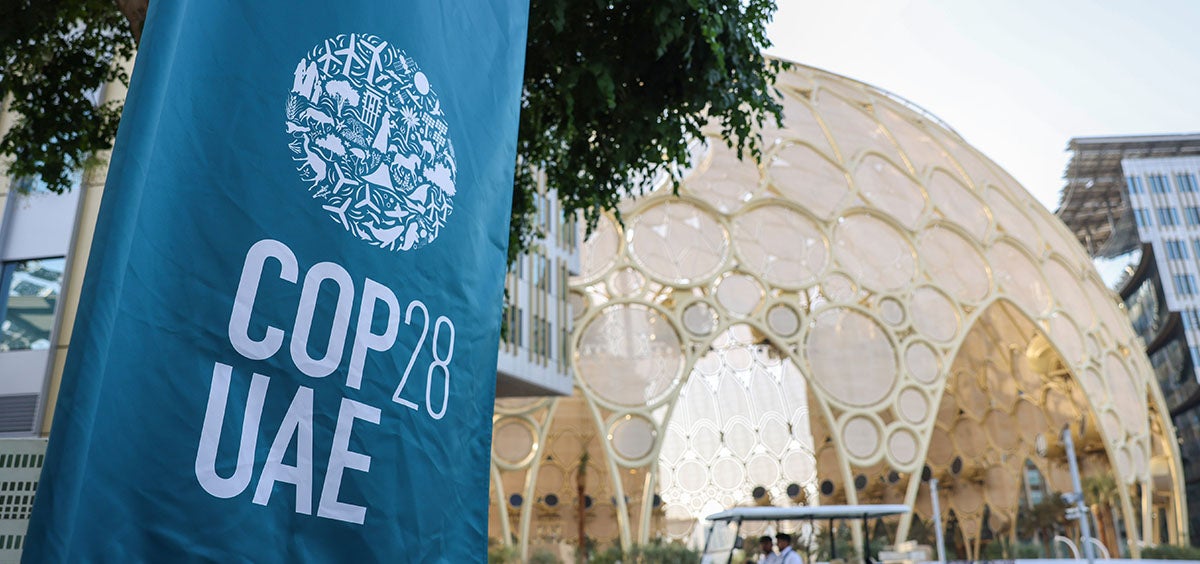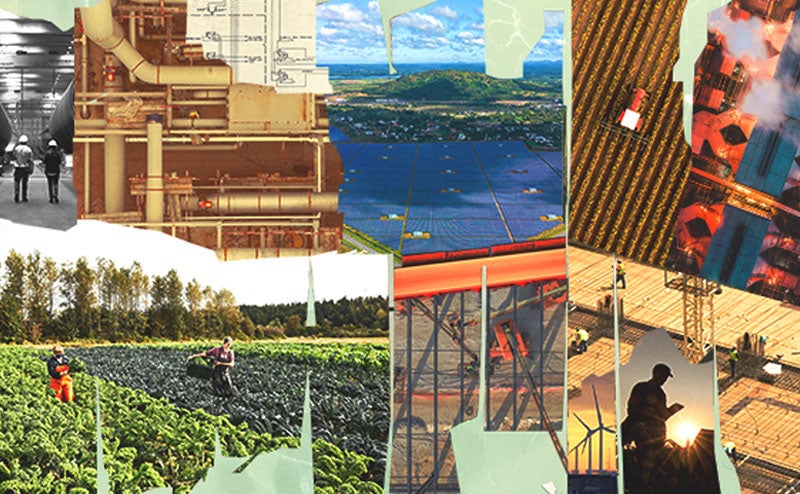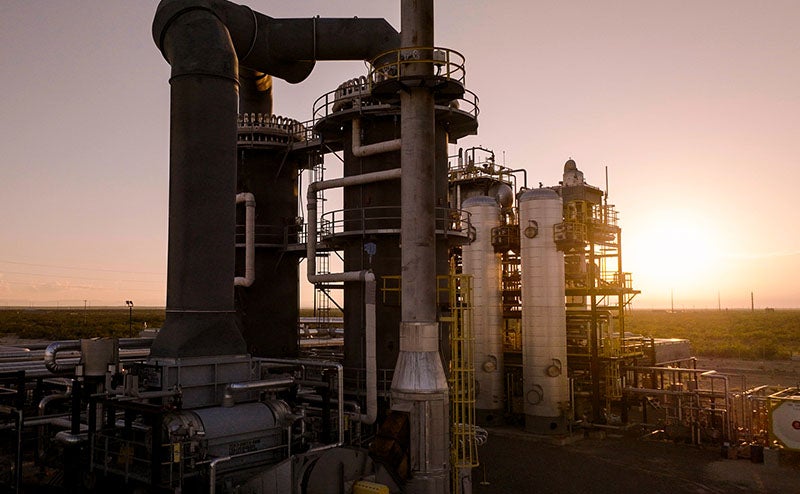The Power raises timely questions about gender dynamics.
Hello from COP28! I’m at the climate conference here in Dubai. I just wrapped up my first day, and it was an exciting, productive, and inspiring start. The energy in the room was just amazing—especially from the young activists whose passion sets the tone for every COP. You can read more about why I’m feeling optimistic about the days ahead here.
I participated in a number of super interesting sessions today, including one on food security. It’s remarkable to see how climate adaptation has been elevated at COP in recent years. I’m going to spend a lot of time over the next couple days talking about how we need to help the people who are most vulnerable to climate change.
I was honored to close out the first day of the World Climate Action Summit by addressing COP28 delegates. My remarks took place during a session dedicated to the important role business and philanthropic leaders play in fighting climate change. I spoke about the need to direct climate investment towards projects that maximize the number of lives impacted. You can read the full text of my speech below.
Remarks as prepared
December 1, 2023
COP28 World Climate Action Summit
Good evening. Eight years ago, I joined many of you on the stage in Paris to send three messages to the world.
- The climate crisis demands our immediate attention.
- If we’re going to solve it, we need to invent and scale the innovations that get us to zero.
- To develop these technologies, the public and private sectors came together to make historic commitments.
Eight years later, I am excited to report that these commitments are showing real results. To see proof, just walk around the Innovation Hub. Most of the companies you will find there didn’t exist eight years ago. Some are supported by Breakthrough Energy, the organization I committed to starting in Paris to complement the efforts that governments were undertaking. Others have emerged in recent years and are doing incredible work.
As you know, the world’s emissions can be divided into five sectors. We must get to zero emissions in each one to meet our climate goals.

Electric vehicles and power plants get the most attention, but emissions come from lots of different human activities. The good news is that we are making progress across all five sectors.
In manufacturing, we are well on the way to making steel with electricity instead of coal. Buildings are getting greener thanks to a company that has developed a window that is many times more efficient than most windows used today. The transportation sector continues to take huge leaps forward: Earlier this year, a sports car went 600 miles on a single charge using a new type of battery. In agriculture, one company has developed microbes that provide plants with the fertilizer they need without producing excess greenhouse gases. And earlier this year, I visited the future site of TerraPower’s next-generation power plant in Kemmerer, Wyoming—which will be the most advanced nuclear facility in the world when it opens.
The world is making remarkable progress, but our task is far from complete. We still have a lot of work to do to get to zero in all five areas.
For example, we won’t realize the full potential of the world’s incredible clean electricity advancements without the infrastructure to deliver it. That is why we need to build new, smarter power grids.
We also need to create more pathways to zero. Technologies like clean hydrogen and carbon capture have huge potential but need significant investment.
Philanthropists, governments, and companies need to make big bets now that will help crucial innovations get developed and deployed as quickly as possible. Since Paris, I have put more than $2 billion into clean energy technologies. I plan to double that amount in the coming years, but more investment is needed. If you are in a position to fund a clean energy future, I urge you to do so.
To bring innovations to scale, we need to reduce the cost difference between things that emit and things that don’t—a difference I call the Green Premium. The cost of the transition must be low enough that the whole world can afford it.
I believe there is a path to a zero Green Premium, and I believe that we can still reach our climate goals and achieve zero emissions. But unfortunately, our efforts are complicated by two factors.
First, we must help people adapt to a planet that is already getting warmer.
Our priority should be those who are most affected. That means farmers in sub-Saharan Africa and South Asia, who contribute the least to the problem but suffer the most. Farmers need support so they can produce more crops and livestock even as temperatures rise and the weather gets more extreme. I spoke about this earlier today during the Food Systems Summit, where the Gates Foundation announced a $200 million partnership with the UAE to support food systems innovation.
This starts with arming them with more information, including local, long-range climate forecasts. And it requires developing more sustainable, resilient approaches to crop and livestock production.
For example, scientists have bred 160 drought-tolerant and disease-resistant varieties of maize. Farmers in Zimbabwe who planted one of these varieties harvested enough extra maize to feed their families for nine months.

These were developed by researchers from the agricultural research network called CGIAR. The Gates Foundation is proud to call them one of our partners. Countries must meet the commitment they made two years ago in Glasgow to double the amount of funding for adaptation by 2025—including support for CGIAR’s goal of raising $4 billion.
No other effort to adapt to climate change will have more impact.
The second factor complicating our progress toward our climate goals is a cold, hard truth: The world has limited resources available to reduce inequities. I believe we should devote more. But a realistic level forces us to make choices about which areas get the world’s attention.
Here is another truth: Climate change is a major threat to human welfare. So are food insecurity, malnutrition, and infectious diseases.
Each of these threats is connected to one another. For example, extreme weather is making it harder to grow crops in some parts of the world—which puts more children at risk of malnutrition and makes them more vulnerable to disease.
In a world with limited resources, it may seem like we cannot make progress on climate, health, and development all at once. But nobody would be better off in a world with fewer carbon emissions but more illness, starvation, and death. So, we have to find a way to tackle all three at the same time.
Fortunately, innovation allows us to magnify the impact of our efforts. Just as innovation will get us to zero emissions, it will also allow us to continue the remarkable progress made over the last century to improve human welfare around the world.
Consider the progress we have made in reducing childhood deaths.

In the year 1990, 12 million children died. By 2000, the number had dropped to fewer than 10 million. By 2019, it was below 5 million.
How did we do it? In part, by spending some of the world’s limited resources on a key innovation: Vaccines.
Scientists found new ways to make vaccines that were faster and cheaper but just as safe. They developed new vaccines to tackle deadly diseases like rotavirus. And the world created an organization called Gavi, which has vaccinated over a billion children in low- and middle-income countries—and is already working on climate-sensitive diseases like cholera, whose spread is closely linked with heavy rains and floods.
We can choose to keep this progress going. We can cut childhood deaths in half again by continuing to invest in organizations like Gavi—alongside funding for climate mitigation and adaptation.
Every discussion about allocating scarce resources should begin with a simple question: How can this money save and improve the most lives, now and in the future?
With this question as our guide, in the decades ahead, I believe we can improve human welfare faster than any of us have seen in our lifetimes—and avoid a climate disaster. The work that we have gathered here to discuss will play a huge part in getting us there, and I am inspired by all the commitments being made.
By investing in innovation that works for everyone, we won’t just keep the planet livable. We will make it a better place to live.
Thank you.





